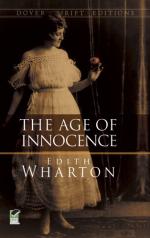Nothing could more dearly give the measure of the distance that the world had travelled. People nowadays were too busy—busy with reforms and “movements,” with fads and fetishes and frivolities—to bother much about their neighbours. And of what account was anybody’s past, in the huge kaleidoscope where all the social atoms spun around on the same plane?
Newland Archer, looking out of his hotel window at the stately gaiety of the Paris streets, felt his heart beating with the confusion and eagerness of youth.
It was long since it had thus plunged and reared under his widening waistcoat, leaving him, the next minute, with an empty breast and hot temples. He wondered if it was thus that his son’s conducted itself in the presence of Miss Fanny Beaufort—and decided that it was not. “It functions as actively, no doubt, but the rhythm is different,” he reflected, recalling the cool composure with which the young man had announced his engagement, and taken for granted that his family would approve.
“The difference is that these young people take it for granted that they’re going to get whatever they want, and that we almost always took it for granted that we shouldn’t. Only, I wonder—the thing one’s so certain of in advance: can it ever make one’s heart beat as wildly?”
It was the day after their arrival in Paris, and the spring sunshine held Archer in his open window, above the wide silvery prospect of the Place Vendome. One of the things he had stipulated—almost the only one— when he had agreed to come abroad with Dallas, was that, in Paris, he shouldn’t be made to go to one of the newfangled “palaces.”
“Oh, all right—of course,” Dallas good-naturedly agreed. “I’ll take you to some jolly old-fashioned place— the Bristol say—” leaving his father speechless at hearing that the century-long home of kings and emperors was now spoken of as an old-fashioned inn, where one went for its quaint inconveniences and lingering local colour.




